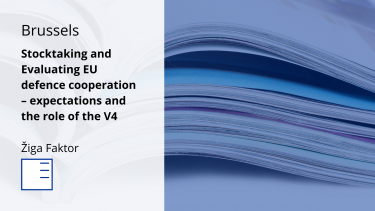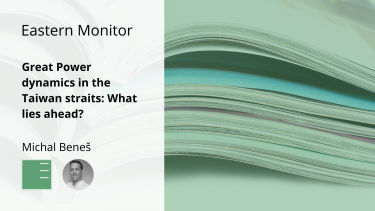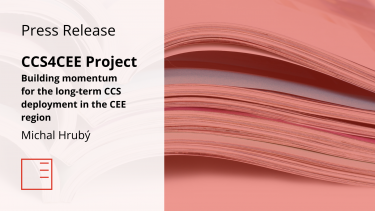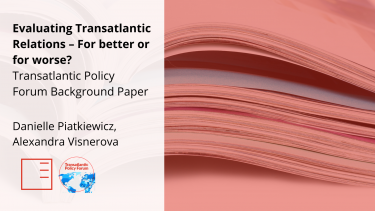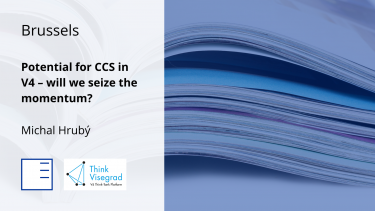REPORT: Stocktaking and Evaluating EU defence cooperation – expectations and the role of the V4
The head of our Brussels office, Žiga Faktor, wrote a report on the panel discussion that took place in a hybrid form in Brussels. During the panel, speakers discussed the latest developments in the NATO Strategic Concept and European defence autonomy debate. In addition, they focused on how Central and Eastern Europe, in particular countries of the Visegrad group, affect the process.
Show more
EASTERN MONITOR: A new methodology for the same problems: Is the future of the enlargement process lost?
In the most recent Eastern Monitor Jovana Vančevska focuses on the issues connected to the Brdo Declaration, the progress concerning the "enlargement process" and EU's commitment to it. Who are the frontrunners of the "enlargement process"? And which countries are stagnant? The author gives us more information about this issue in her paper, as well as its' possible outcomes.
Show more PDF
EASTERN MONITOR: Nová metodika pro stejné problémy: Je budoucnost procesu rozšíření ztracena?
V nejnovějším Eastern Monitoru se Jovana Vančevska zaměřuje na otázky spojené s Brdskou deklarací, na pokrok v „procesu rozšíření“ a na závazek EU k němu. Kdo jsou průkopníci „procesu rozšíření“? A které země stagnují? Více informací o této problematice poskytuje autorka ve svém paperu, stejně jako možné výsledky situace.
Show more PDF
Eastern Monitor: Great Power dynamics in the Taiwan straits: What lies ahead?
In the last Eastern Monitor, Michal Beneš focused on the dynamic conflict between the great powers in the Taiwan Strait. He focused on what might await us in the future. The text doesn't aim to find a solution to this complex conflict but instead presents several possible future scenarios to its readers.
Show more PDF

Eastern Monitor: Dynamika velmocí v Tchajwanském průlivu: Co nás čeká?
Michal Beneš se v posledním Eastern Monitoru věnoval dynamickému konfliktu velmocí v Tchajwanském průlivu. Zaměřil se na to, co by nás mohlo čekat v budoucnu. V textu se nesnaží nalézt řešení tohoto složitého konfliktu, ale místo toho čtenářům předkládá několik možných budoucích scénářů.
Show more PDF

Press Release: CCS4CEE Project - Building momentum for the long-term CCS deployment in the CEE region
The CCS4CEE project analyses the current state of development of CCS (carbon capture and storage) technology in Central and Eastern Europe and aims primarily at renewing the debate on CCS technology and enabling its future deployment in the region.
Show more PDFEvaluating Transatlantic Relations – For better or for worse?
Our Research Fellow Danielle Piatkiewicz and Project Manager Alexandra Visnerova wrote a background paper under the Transatlantic Policy Forum in which they evaluate the new transatlantic agenda and goals of both EU and the US and assess how the two sides can work closer together to tackle geopolitical challengers, align on security, trade, climate, and digital policies. The paper offers recommendations on how to strengthen the transatlantic relationship, with special emphasis placed on the Central and Eastern European region.
Show more PDF
Policy Paper: Potential for CCS in V4 – will we seize the momentum?
Michal Hrubý, a Researcher at EUROPEUM Institute for European Policy, wrote under the Think Visegrad in Brussels project his policy paper "Potential for CCS in V4 – will we seize the momentum?".
Show more PDFPolicy Paper: Terrorism, Cryptocurrencies and the EU Response
In her policy paper "Terrorism, Cryptocurrencies and the EU Response", written under the project Think Visegrad in Brussels, Asya Metodieva, a research fellow at the Institute of International Relations Prague, writes about what terrorists use cryptocurrencies for, assesses ongoing regulatory initiatives at the EU level, and last but not least, examines how the Visegrad Four (V4) countries view cryptocurrencies in relation to terrorism-related threats at the level of national level.
Show more PDFRadio Z: Hundreds of Middle Eastern migrants detained in Germany near the border with Poland in recent days, they entered the EU via Belarus
Martin Vokálek, Executive Director of the EUROPEUM Institute for European Policy, commented on current events on the Belarus-Polish border. Precisely because of migration, Poland extended the state of emergency on the border with Belarus. The problem will be discussed by the European Parliament.
Show more
Staroměstské náměstí 4/1
Prague 1 - Staré Město
110 00
tel.: +420 212 246 552
email: europeum@europeum.org
https://www.europeum.org
